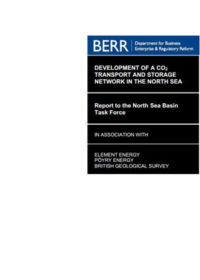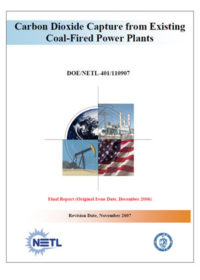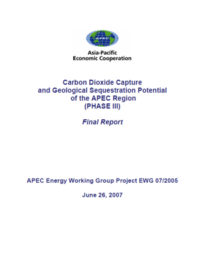Resources
Publications
Our publications, reports and research library hosts over 500 specialist reports and research papers on all topics associated with CCS.
View our Publication Library Disclaimer.
Filter by
Detection of surface deformation related with CO2 injection by DInSAR at In Salah, Algeria
1st January 2008
Topic(s): Carbon capture use and storage (CCUS), CO2 storage, Engineering and project delivery
This paper describes the use of interferometric synthetic aperture radar to map changes in the surface of the Krechba natural gas field at In Salah, Algeria. The authors state this this is the first instance the spaceborne system has been used for this purpose. They describe methodology and results, concluding that this system is a promising, cost-effective monitoring tool compared with other conventional geophysical surveys.
Disclaimer
The content within the Global CCS Institute Publications, Reports and Research Library is provided for information purposes only. We make every effort and take reasonable care to keep the content of this section up-to-date and error-free. However, we make no claim as to its accuracy, currency or reliability.
Content and material featured within this section of our website includes reports and research published by third parties. The content and material may include opinions and recommendations of third parties that do not reflect those held by the Global CCS Institute.
Coupled reservoir-geomechanical analysis of CO2 injection at In Salah, Algeria
1st January 2008
Topic(s): Carbon capture use and storage (CCUS), CO2 storage, Engineering and project delivery
This paper describes coupled reservoir-geomechanical modeling of CO2 injection at Krechba, at the In Salah geologic carbon sequestration (GCS) project in Algeria. Several studies have investigated surface uplift surrounding Krechba injection sites. In this approach, the authors simulate the actual CO2 injection in a three-dimensional model around one horizontal injection well, and conduct sensitivity studies to determine the cause and mechanisms of the uplift.
Disclaimer
The content within the Global CCS Institute Publications, Reports and Research Library is provided for information purposes only. We make every effort and take reasonable care to keep the content of this section up-to-date and error-free. However, we make no claim as to its accuracy, currency or reliability.
Content and material featured within this section of our website includes reports and research published by third parties. The content and material may include opinions and recommendations of third parties that do not reflect those held by the Global CCS Institute.
Evaluating the impact of fractures on the long-term performance of the In Salah CO2 storage site
1st January 2008
Topic(s): Carbon capture use and storage (CCUS), CO2 storage, Engineering and project delivery
This paper presents the authors’ current knowledge on the characterisation of faults and fractures at the CO2 storage demonstration site at the Krechba natural gas field at In Salah, Algeria. The authors discuss their current understanding of fault and fracture properties at Krechba, which is essential for realistic predictions of CO2 flow behaviour at the site. Furthermore, an extensive monitoring program is underway to improve the characterisation of the Krechba field as storage location and to verify the applicability of a number of monitoring methods for CO2 storage purposes.
Disclaimer
The content within the Global CCS Institute Publications, Reports and Research Library is provided for information purposes only. We make every effort and take reasonable care to keep the content of this section up-to-date and error-free. However, we make no claim as to its accuracy, currency or reliability.
Content and material featured within this section of our website includes reports and research published by third parties. The content and material may include opinions and recommendations of third parties that do not reflect those held by the Global CCS Institute.
Satellite imaging to monitor CO2 movement at Krechba, Algeria
1st January 2008
Topic(s): Carbon capture use and storage (CCUS), CO2 storage, Engineering and project delivery
This paper describes current and future use of satellite data to monitor and model injection sites at the Krechba natural gas field at In Salah, Algeria. The authors explain the current monitoring programme at Krechba, and the role satellite imagery plays. The authors conclude that experience at In Salah shows that satellite imagery now has the resolution to be a key monitoring technology for onshore storage.
Disclaimer
The content within the Global CCS Institute Publications, Reports and Research Library is provided for information purposes only. We make every effort and take reasonable care to keep the content of this section up-to-date and error-free. However, we make no claim as to its accuracy, currency or reliability.
Content and material featured within this section of our website includes reports and research published by third parties. The content and material may include opinions and recommendations of third parties that do not reflect those held by the Global CCS Institute.
Carbon capture and storage in the CDM
1st December 2007
Topic(s): Carbon capture use and storage (CCUS)
The possible inclusion of CCS projects under the Clean Development Mechanism (CDM) raises a number of issues, including how to deal with potential leaks of CO2 and associated permanence and liability issues, what an appropriate project boundary is, how to deal with CDM-“leakage” (i.e. emissions resulting from the project activity beyond its boundaries) and what the possible impact of including CCS would be on the broad CDM portfolio. This paper assesses these issues.
Disclaimer
The content within the Global CCS Institute Publications, Reports and Research Library is provided for information purposes only. We make every effort and take reasonable care to keep the content of this section up-to-date and error-free. However, we make no claim as to its accuracy, currency or reliability.
Content and material featured within this section of our website includes reports and research published by third parties. The content and material may include opinions and recommendations of third parties that do not reflect those held by the Global CCS Institute.
Carbon capture and storage projects under the climate policy regime: The case of Halten CO2
1st December 2007
Topic(s): Carbon capture use and storage (CCUS), Policy law and regulation
The aim of this study is to assess institutional, political and legislative issues associated with the planned “CO2 value chain from Tjeldbergodden to Draugen and Heidrun” industrial project. The Draugen and Heidrun oil reservoirs are two important components of the value chain and are situated on the Halten Bank off mid-Norway. For short we refer to the project as the “Halten CO2 project”. This study is supplemented by an economic study and a study of legislative issues. The economic study is carried out by CICERO and focuses on the social value of the Tjeldbergodden industrial project. The legislative study focuses on environmental liability, discusses the relevant Norwegian legislation, and point out which adjustments Norwegian authorities should consider before CO2 chains become operative in Norway. It is carried out by the Scandinavian Institute of Marine Law at University of Oslo (Berger, 2007a and 2007b).
Disclaimer
The content within the Global CCS Institute Publications, Reports and Research Library is provided for information purposes only. We make every effort and take reasonable care to keep the content of this section up-to-date and error-free. However, we make no claim as to its accuracy, currency or reliability.
Content and material featured within this section of our website includes reports and research published by third parties. The content and material may include opinions and recommendations of third parties that do not reflect those held by the Global CCS Institute.
The In Salah Gas CO2 Storage Project
1st December 2007
Topic(s): Carbon capture use and storage (CCUS), CO2 storage, Engineering and project delivery
This paper provides an overview of the In Salah Gas CO2 Storage Project, based in the Ahnet-Timimoun Basin in the Algerian Central Sahara. The project was established as a public demonstration of storage assurance, to capture and reinject waste CO2 from natural gas production, that would have otherwise been vented to the atmosphere. This is a Joint Industry Project (JIP) with participation from industry, academia, government and non-government organisations.
Disclaimer
The content within the Global CCS Institute Publications, Reports and Research Library is provided for information purposes only. We make every effort and take reasonable care to keep the content of this section up-to-date and error-free. However, we make no claim as to its accuracy, currency or reliability.
Content and material featured within this section of our website includes reports and research published by third parties. The content and material may include opinions and recommendations of third parties that do not reflect those held by the Global CCS Institute.
Development of a CO2 transport and storage network in the North Sea: report to the North Sea Basin Task Force
6th November 2007
Topic(s): Carbon capture use and storage (CCUS), CO2 storage, CO2 transport
The UK and Norwegian governments engaged Element Energy Limited, Pöyry Energy, and the British Geological Survey to examine the role that a pipeline infrastructure for carbon dioxide capture and storage (CCS) could play in reducing CO2 emissions from both countries.
This report, commissioned by the UK Department of Business, Enterprise and Regulatory Reform (formerly the Department of Trade and Industry) on behalf of the UK, Norway and North Sea Basin Task Force, examines possible development pathways for a CCS pipeline infrastructure connecting large UK and Norwegian sources with appropriate sinks in the North Sea and describes the implications for both countries.
Disclaimer
The content within the Global CCS Institute Publications, Reports and Research Library is provided for information purposes only. We make every effort and take reasonable care to keep the content of this section up-to-date and error-free. However, we make no claim as to its accuracy, currency or reliability.
Content and material featured within this section of our website includes reports and research published by third parties. The content and material may include opinions and recommendations of third parties that do not reflect those held by the Global CCS Institute.
Carbon dioxide capture from existing coal-fired power plants
1st November 2007
Topic(s): Carbon capture use and storage (CCUS), CO2 capture
This study was performed to evaluate the technical and economic feasibility of various levels of CO2 capture (e.g., 90%, 70%, 50%, and 30%) for retrofitting an existing pulverized coal-fired power plant (Conesville #5 unit in Ohio, United States) using advanced amine-based capture technology.
Disclaimer
The content within the Global CCS Institute Publications, Reports and Research Library is provided for information purposes only. We make every effort and take reasonable care to keep the content of this section up-to-date and error-free. However, we make no claim as to its accuracy, currency or reliability.
Content and material featured within this section of our website includes reports and research published by third parties. The content and material may include opinions and recommendations of third parties that do not reflect those held by the Global CCS Institute.
Carbon capture and storage at Mongstad
1st August 2007
Topic(s): Carbon capture use and storage (CCUS)
This project, the importance of which the government compared to landing on the moon, has been heavily debated in recent months. Removing and storing the carbon dioxide (CO2) from gas-fired power plants represents a much cleaner way to produce electricity and make use of fossil fuels. This is a new and costly technology. There is a lot of uncertainty associated with these costs, and as it turns out – the Mongstad project will not be in the lower range of these costs.
Disclaimer
The content within the Global CCS Institute Publications, Reports and Research Library is provided for information purposes only. We make every effort and take reasonable care to keep the content of this section up-to-date and error-free. However, we make no claim as to its accuracy, currency or reliability.
Content and material featured within this section of our website includes reports and research published by third parties. The content and material may include opinions and recommendations of third parties that do not reflect those held by the Global CCS Institute.
Expert workshop on financing carbon capture and storage: Barriers and solutions
1st July 2007
Topic(s): Carbon capture use and storage (CCUS), Economics
The CCS Expert Meeting on Finance took place over two days in London. The Meeting was by invitation only and limited to 80 people that included representatives from Governments, industry, the financial sector academia and research organizations.
The main purpose of the conference was to provide a clearer picture of the options available to finance CCS projects and to increase the involvement of experts from the financial sector and to discuss financial instruments with industry and Government representatives. The ultimate outcome of this work will be to identify, encourage and develop world-wide collaboration and practical development of financial mechanisms to accelerate the progression of CCS projects from R&D to commercial reality.
.
Disclaimer
The content within the Global CCS Institute Publications, Reports and Research Library is provided for information purposes only. We make every effort and take reasonable care to keep the content of this section up-to-date and error-free. However, we make no claim as to its accuracy, currency or reliability.
Content and material featured within this section of our website includes reports and research published by third parties. The content and material may include opinions and recommendations of third parties that do not reflect those held by the Global CCS Institute.
Carbon dioxide capture and geological sequestration potential of the APEC region (phase III): final report
26th June 2007
Topic(s): Carbon capture use and storage (CCUS), Economics
The purpose of this project (phase III) was to increase the capacity, expand the knowledge and awareness of APEC economies (China and Mexico) to assess the potential of CCS technologies within their own economies, evaluate the options and implement successful CCS initiatives.
Disclaimer
The content within the Global CCS Institute Publications, Reports and Research Library is provided for information purposes only. We make every effort and take reasonable care to keep the content of this section up-to-date and error-free. However, we make no claim as to its accuracy, currency or reliability.
Content and material featured within this section of our website includes reports and research published by third parties. The content and material may include opinions and recommendations of third parties that do not reflect those held by the Global CCS Institute.







